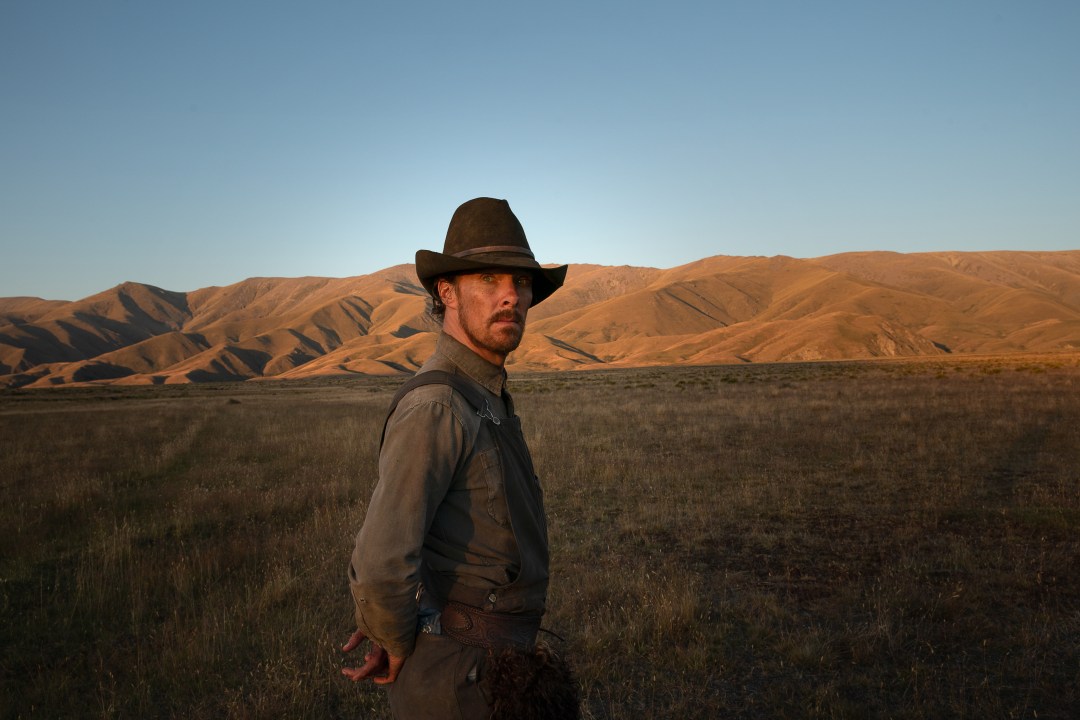Jane Campion’s The Power of the Dog could also be called The Power of Benedict Cumberbatch, as he’s so spectacular. He plays a ruggedly masculine cowboy with an inner life that isn’t written, but that we somehow still see. It is also clearly Campion’s best film since The Piano or my own favourite, An Angel at My Table (as for Bright Star, we said we’d never talk of it again — why did you even bring it up? We all have our off days).
If Cumberbatch doesn’t win every award going, I’ll eat my hat, but probably not his ten-gallon one
The film is based on the 1967 novel by Thomas Savage that was praised to the skies when published but sold very few copies, unfathomably. (Same with John Williams’s Stoner.) Set in Montana in 1925, it’s about two brothers, Phil (Cumberbatch) and George (Jesse Plemons), who own and run a cattle ranch. They are polar opposites. Phil is brilliantly clever, but mean-spirited and cruel, and so ruggedly masculine he can castrate a bull with his bare hands. (The book was optioned once with Paul Newman cast as Phil but, apparently, he didn’t have the hands for it. Too small.) Meanwhile, George is slower, softer, kinder, stockier. (Phil calls him ‘fatso’.)
The pair grew up on the ranch and have shared a bedroom since childhood, but along comes a divisive force in the form of Rose (Kirsten Dunst), the widow who runs the local boarding house. George marries her and she comes to live at their ranch with her son, Peter (Kodi Smit-McPhee), who is studying to be a doctor and makes paper flowers and is delicate and not ruggedly masculine in any way whatsoever. A ‘sissy’, declares Phil, who burns the flowers with his big old castrating hands.
You think you know where this is going, and to a certain extent it goes exactly there. Phil does not accept Rose and Peter. Phil makes their life hell. Just the way he plays the banjo or whistles is psychologically bullying somehow. But it’s wonderfully complex, and over time we understand that Phil’s hatred is self-hatred. This is never spelled out. A bathing scene tells us a little something. The way Phil braids rawhide tells us a little something. (All that intertwining.) The way Phil talks up his childhood mentor, Bronco Henry, tells us a little more. But these are like incomplete thoughts rather than fully formed chunks of information. Then Phil changes tack and starts to mentor Peter, which is worrying as well as tense. Is Peter being lured into some kind of trap? I will say no more. I will only say that the ending will knock you sideways and Phil should have worn gloves, like all the other ranch hands.
It’s been said that The Power of the Dog, which gets its name from the psalms (look it up), explores ‘toxic masculinity’, but before you go berserk below the line, it is more universal than that. The film explores the pain of anyone who is expected to be a certain way, and conforms at the expense of their true identity. Cumberbatch embodies this undertow miraculously, making Phil tragic rather than purely brutal. He captures all that repressed desire and also the agony of knowing he will never be loved.
The other performances are top-notch too. Dunst (and her dimples) brings more to Rose than was ever in the book, Plemons is sweetly ineffective as George, while Smit-McPhee makes Peter what Phil can’t be: comfortable in his own skin. Meanwhile, Campion creates a real sense of a time amid the sweeping, vast landscape and never lets this tip into melodrama. But it’s Cumberbatch’s film and if he doesn’t win every award going I’ll eat my hat, but probably not his ten-gallon one. Fair’s fair.







Comments